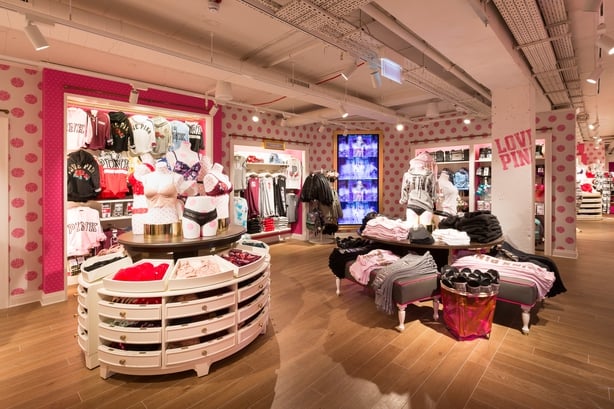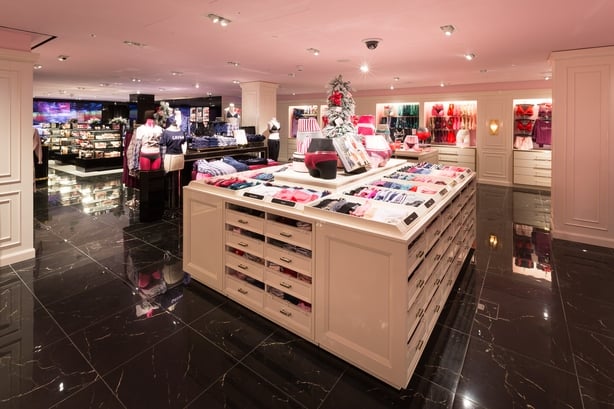Judging by the winding queues and prevalence of bright pink shopping bags in the capital, Victoria’s Secret has been warmly welcomed onto the landscape of the Irish retail market. However, as with many companies of their stature, certain elements of the brand remain somewhat hazy.
The latest addition to the American retail giant’s chain sits in stark contrast opposite the newly refurbished Bewley’s tearooms in the heart of Dublin’s Grafton Street.
Victoria Secret’s vibrant and somewhat more affordable Pink range caters to teenagers and college students, while the more sophisticated lingerie attracts an older and wealthier clientele.
Owned by L Brands which also runs La Senza and Bath & Body Works, the American retail giant governs international lingerie sales, with estimates of their domination of the intimates market as high as 40%.

Ethos of Victoria Secret
The brand was created by Roy Raymond in 1977 after he felt uncomfortable shopping for lingerie for his wife in regular department stores. With this experience of the male shopper in mind as well as curating a more fashionable underwear selection than the functional range of the era, he and his wife Gaye opened the first Victoria’s Secret store.
The centrality of the male experience in the company’s inception calls into question whether Victoria’s Secret is about female sexual empowerment or merely satisfying the male gaze.
Recently, bizarre footage emerged from Denmark of a sea of predominantly male Irish soccer supporters crowded around the Danish branch cheering as women emerged clutching shopping bags. While this was likely intended as a bit of fun by football fans caught up in the moment, it does call into question how society at large views Victoria’s Secret products and for whom they are really intended.
Women’s Rights
When it comes to female empowerment it has been suggested that the manufacture of Victoria’s Secret clothing benefits the independence of women in regions of the developing world.
According to a report by the Mail Online, in the rural Indian region of Kanchipuram, the Victoria’s Secret factory offers employment to women, many of whom would traditionally not have worked outside the home. Reports suggest that this offers these women greater independence, delaying marriage and providing a means of paying for education for their children and siblings.
However, while it seems that the brand pays more than the average industrial wage in these areas, wages are brutally low by western standards where the costly products are being sold.
Interviews in the article indicate that workers earn $130 per month. Given that local farm workers earn about $2 per day and therefore considerably less per month, this initially appears acceptable. However, when we consider that many customers spend that amount in one trip to the retailer alone, the monthly wage is evidentially grossly unfair.

Animal testing
While controversies surrounding product origin may have gone unnoticed by Irish consumers owing to their appearance in foreign media, Irish shoppers were immediately made aware of the company’s animal testing issues.
Protestors from the National Animal Rights Association (NARA) appeared outside the store on the store’s VIP promotional night as well as its first day open to the public.
Sporting posters with graphic images of alleged animal cruelty, protesters called on shoppers to boycott the Irish branch over concerns about animal testing.
The brand’s range of toiletries, which they sell alongside their underwear and apparel, are tested on animals owing to the fact that they sell in China where testing is legally required.
Victoria’s Secret are not alone in this. Many international brands test on animals in regions where it is not mandatory while others do so in order to sell their wares to the ever-expanding Chinese market.
With the ever-increasing rise of the ethical consumer as well as the rising popularity of veganism and vegetarianism, many brands have bowed to public pressure to cease testing on animals. Indeed major selling points of brands like Huda Beauty, Elf and Urban Decay centre around their cruelty-free policies.
Despite being contacted regarding the ethos of the brand, workers rights, and animal testing, Victoria’s Secret declined to answer questions or comment on any of the issues raised.
Although their products are undeniably beautiful and will no doubt feature on many lists this Christmas, consumers may want to carefully consider the issues surrounding the more secretive aspects of Victoria’s Secret.


